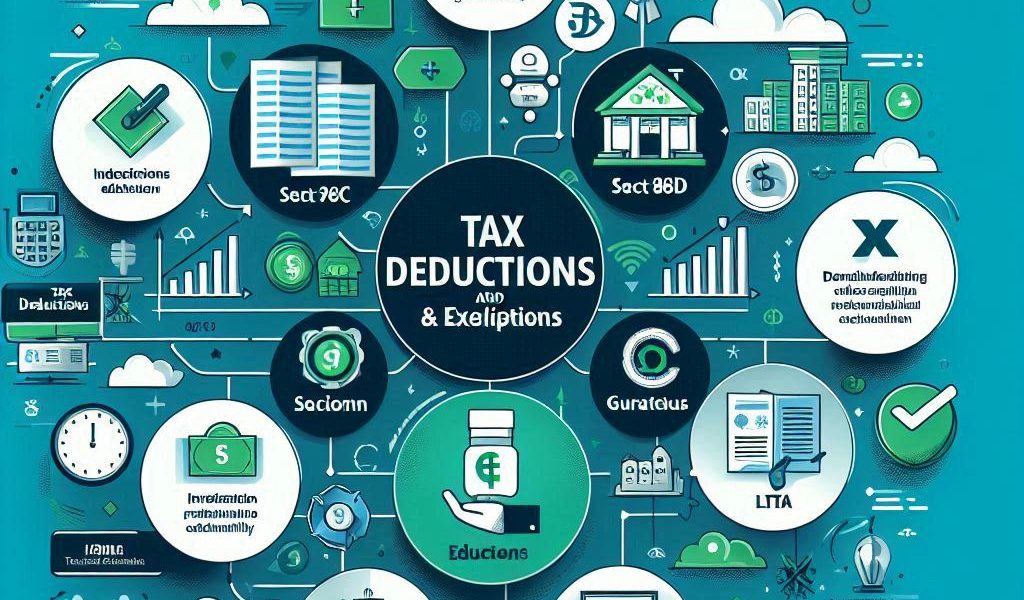Taxes are an inevitable part of financial planning, but smart taxpayers know how to optimize their tax liability legally. The Indian tax system provides several deductions and exemptions that help individuals and businesses reduce their taxable income and lower their overall tax burden.
This comprehensive guide will explore key tax deductions and exemptions under the Income Tax Act, helping you understand how to save on taxes while staying compliant with the law.
Understanding Tax Deductions and Exemptions
What Are Tax Deductions?
A tax deduction is an amount that reduces your total taxable income, lowering the tax you need to pay. Deductions are available under various sections of the Income Tax Act and apply to expenses like investments, insurance premiums, home loans, and medical expenses.
What Are Tax Exemptions?
Exemptions refer to certain types of income that are completely or partially excluded from taxation. For example, agricultural income and specific allowances provided by employers fall under exemptions.
Key Tax Deductions Under the Income Tax Act
1. Section 80C: Deductions for Investments and Savings
Section 80C is the most widely used tax-saving option, allowing deductions up to ₹1.5 lakh per financial year. Eligible investments include:
- Public Provident Fund (PPF)
- Employees’ Provident Fund (EPF)
- National Savings Certificate (NSC)
- Life Insurance Premiums
- Equity-Linked Savings Scheme (ELSS)
- Sukanya Samriddhi Yojana (SSY)
- Tuition fees for children’s education
- Principal repayment of home loan
- 5-year fixed deposit in banks/post offices
2. Section 80D: Deductions for Medical Insurance
To encourage health insurance coverage, Section 80D provides deductions for medical insurance premiums:
- Up to ₹25,000 for self, spouse, and dependent children.
- Additional ₹25,000 for parents below 60 years (₹50,000 if parents are senior citizens).
- ₹5,000 for preventive health check-ups.
3. Section 80E: Interest on Education Loan
The interest paid on an education loan for higher studies (self, spouse, or children) qualifies for a tax deduction under Section 80E. This deduction has no upper limit and is available for eight consecutive years from the year of repayment.
4. Section 24(b): Home Loan Interest Deduction
Taxpayers can claim deductions on home loan interest payments:
- Up to ₹2 lakh for a self-occupied property under Section 24(b).
- No upper limit for let-out properties (subject to net loss restrictions).
5. Section 80G: Donations to Charitable Institutions
Contributions to approved charitable organizations qualify for deductions under Section 80G. Some donations offer 100% deductions, while others provide 50% deductions (subject to specified limits).
6. Section 80TTA and 80TTB: Interest Income Deductions
- 80TTA: Deduction up to ₹10,000 on interest earned from savings bank accounts.
- 80TTB: Deduction up to ₹50,000 for senior citizens on interest from savings accounts, fixed deposits, and recurring deposits.
7. Section 80DD & 80DDB: Deductions for Medical Treatment
- 80DD: Deductions up to ₹75,000 (₹1,25,000 for severe disability) for expenses incurred on a disabled dependent.
- 80DDB: Deductions for medical treatment of specified diseases (₹40,000 for individuals, ₹1,00,000 for senior citizens).
Key Tax Exemptions in India
1. House Rent Allowance (HRA) Exemption
If you live in rented accommodation, you can claim HRA exemption under Section 10(13A). The exemption is calculated based on:
- Actual HRA received.
- 50% of salary (metro cities) or 40% of salary (non-metro cities).
- Rent paid minus 10% of salary.
2. Leave Travel Allowance (LTA)
Employees can claim exemption on travel expenses for domestic vacations taken with family. LTA can be claimed twice in a four-year block.
3. Gratuity Exemption
Gratuity received by employees is tax-exempt up to a specified limit under Section 10(10):
- Up to ₹20 lakh for government employees.
- For private employees, least of the following is exempt:
- ₹20 lakh.
- Last drawn salary × 15/26 × years of service.
- Actual gratuity received.
4. Agricultural Income
Agricultural income is fully exempt from tax under Section 10(1). However, if total income exceeds the basic exemption limit, it is considered for tax rate calculations.
5. Provident Fund (PF) Withdrawals
- Employee Provident Fund (EPF) withdrawals are exempt from tax if the employee has completed 5 years of continuous service.
- Public Provident Fund (PPF) maturity amount is completely tax-free.
6. Maturity Proceeds from Life Insurance
Under Section 10(10D), the sum received on the maturity of a life insurance policy is exempt from tax if:
- The policy premium does not exceed 10% of the sum assured.
- The policy term is at least 5 years.
Strategies to Reduce Tax Liability Legally
- Maximize Section 80C Investments – Utilize the full ₹1.5 lakh limit.
- Opt for the Right Tax Regime – Choose between the old and new tax regime based on your benefits.
- Claim Deductions on Home Loans – Use both Section 80C (principal) and Section 24(b) (interest) deductions.
- Utilize HRA Exemption – Structure your salary components efficiently.
- Invest in NPS (National Pension System) – Additional ₹50,000 deduction under Section 80CCD(1B).
- Donate to Charity – Reduce tax liability while contributing to a noble cause.
- Keep Medical Insurance Active – Save tax and ensure health security.
- Claim Education Loan Interest – Use Section 80E for tax-free higher education financing.
- Use LTA Smartly – Plan vacations strategically to avail LTA exemption.
- Track Interest Earnings – Use 80TTA/80TTB to avoid unnecessary tax on bank interest.
Conclusion
Understanding tax deductions and exemptions can significantly reduce your tax liability while ensuring compliance with Indian tax laws. By leveraging available tax-saving options wisely, you can optimize your financial planning and maximize your savings.
It is advisable to consult a tax professional to ensure correct tax planning and filing. Stay informed, invest wisely, and minimize your taxes legally!




